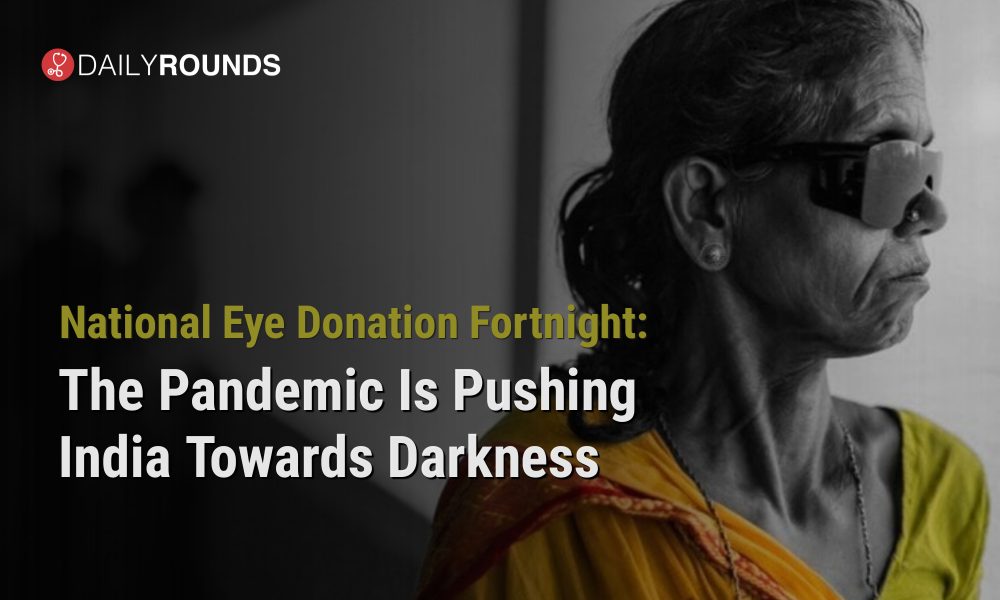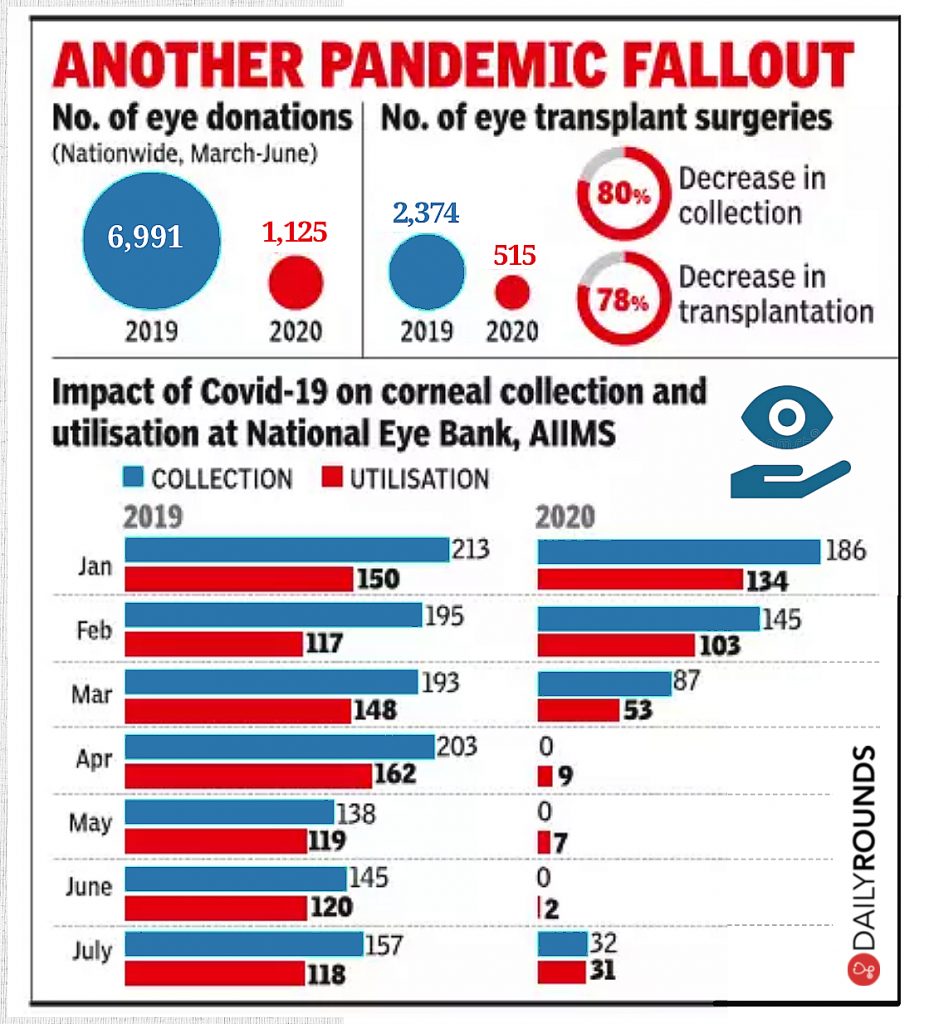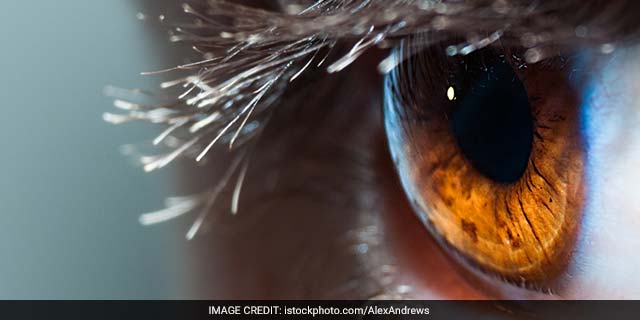
National Eye Donation Fortnight: The Pandemic Is Pushing India Towards ‘Darkness’
The National Eye Donation Fortnight is observed every year from 25th August to 8th September under the National Programme for Control of Blindness & Visual Impairment. It is a campaign that aims to create mass public awareness about the importance of eye donation and to motivate people to pledge their eyes for donation after death.
According to the World Health Organization, corneal diseases are among the major causes of vision loss and blindness, after cataract and glaucoma. Approximately five percent of the world population is blind due to corneal diseases alone. The National Blindness and Visual Impairment Survey 2019, jointly conducted by AIIMS (Delhi) and the Ministry of Health and Family Welfare reported that corneal blindness was the leading cause of blindness among patients aged less than 50 years in India, accounting for 37.5% of the cases and was the second leading cause of blindness among patients above the age of 50 years.
Altogether, more than 68 lakh people in India suffer from blindness due to impairment of the cornea. To remedy this, cornea donated by a deceased person is used to replace the impaired cornea in the patient. Around two lakh corneas are required in India every year, however, only around 55,000 corneas are available in normal circumstances due to lax donations.
A cornea donation can be lifesaving and life-giving. Corneal transplants successfully restore vision to recipients 95% of the time. Additionally, cornea transplants reduce pain and improve the appearance of the unhealthy cornea. While whole eye donations cannot be used for transplant, they can be used for research and education purposes as well. World over, eye research has led to advancements in the understanding of the cause and effects of conditions such as glaucoma, retinal disease, eye complications of diabetes, and other sight disorders. This research can even lead to new treatments and possible cures.
There are plenty of misunderstandings with regard to eye donation among the general community, one being that the entire eyes of the donor are gouged out, disfiguring the face of the deceased. This is not true, in most cases only the cornea of a person is removed and stored separately, which means that the person will not be disfigured and the sentiments of the loved ones of the disease would be taken care of.
The eye donation of the deceased can be authorized by the next of kith & kin even if the deceased did not pledge to donate his / her eyes before death. Age or systemic illnesses such as diabetes or hypertension, heart disease, kidney disease, etc. are no barriers for eye donations. In fact, people suffering from astigmatism, farsightedness, short-sightedness, or those who wear spectacles for other corrective measures can also donate their eyes posthumously. Additionally, a donor’s blood type does not have to match the recipient’s blood type. This means that everyone, except those suffering from AIDS, hepatitis, leukemia, and other communicable diseases, are universal donors for corneal tissue!
Another Pandemic Fallout!
The eye-banking system has been one of its worst victims among the routine non-emergency medical activities that have borne the brunt of the COVID-19 pandemic. The eye-banking guidelines of various countries, including India, advised temporary suspension of donor cornea retrieval and elective corneal transplantation surgeries when active lockdown measures were being implemented. This led to almost negligible cornea retrieval in April-May with more than 90% fall in corneal transplant surgeries.
“When the COVID outbreak started to peak in April, we had to temporarily suspend retrieval of corneal tissue and put all planned corneal transplants on hold. This resulted in a big reduction in donations and transplants conducted at the institute,” says Dr. J S Titiyal, chairman, National Eye Bank.

Data shared by the AIIMS Delhi, which runs one of the most active eye transplant programmes in India, shows only 450 cornea donations this year between January and July against 1,244 in the corresponding period of 2019. The new guidelines for the retrieval of cornea require COVID-19 testing and other measures, which are seen as disincentives to donors. Last year, between January and July, AIIMS conducted 934 corneal transplant surgeries. This year, this number slid to 339.
Back in April, a 47-year-old resident from Dwarka wanted to donate the eyes of his deceased wife. He wanted to fulfill the pledge taken by his wife about donating her eyes. In his efforts to donate her eyes the man along with an activist who works with visually impaired people, approached four eye banks, including the eye bank at the All India Institute of Medical Sciences Delhi amid the nationwide lockdown. However, none of them allowed his wife to donate her eyes because no elective surgeries were allowed during the second phase of the lockdown.
This incident could well be one among many which happened all across the country during this phase. Several thousands of people who wished to donate their eyes to help solve India’s growing problem of corneal blindness have been unable to do so.

In the light of the pandemic, the Eye Bank Association of India (EBAI) came out with a detailed advisory on precautionary measures with regard to corneal tissue retrieval to ensure maximum safety of tissue recipients and those handling them. Similarly, recommendations from the Global Alliance of Eye Bank Associations call for the outright avoidance of tissues from donors recently infected with or exposed to COVID-19 even though there is no evidence of coronavirus transmission through tissues or cell transplantation.
However, the FDA guidelines further indicate that there is currently no evidence for transmission of respiratory viruses in general through tissue transplantation, implantation, or infusion, and therefore do not recommend tissue banking establishments use additional laboratory screening for asymptomatic human cells, tissues, and cellular and tissue-based products (HCT/P) donors.
There’s a high time need to put in place clear-cut objectives and guidelines for eye donation in the country. The nation can’t afford to move any further with the laxity brought about by the pandemic, because there are plenty of people in India who are yet to witness the colours of life!
Remember, there are millions of people who are unable to read this content with their naked eyes, so if you have read it, it’s time to act for them!
Follow and connect with us on Twitter | Facebook | Instagram